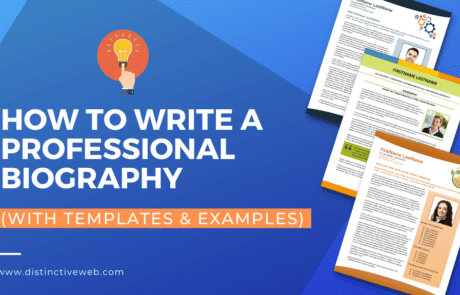
Are you self-employed and work in the gig economy (or want to work in the gig economy) as a freelancer, contractor, or management consultant? If your answer is yes, you have probably wondered about how to write a freelancer resume and how to include your freelance work on your resume.
While a resume is important for any job search, your freelancer resume takes on an even more significant role as you must sell your skills as a self-employed person for every new freelance job or consulting gig you take on. And while you might sell your services for a long-term—even multi-year—contract or project, many freelancers take on multiple new jobs every year, working with multiple employers.
All of this can complicate writing a resume as the traditional chronological format that you might choose if you were in a traditional employment role usually won’t work for a freelancer resume.
But writing a resume to pursue freelancing job opportunities doesn’t have to be hard. The key is to shift the way you think about your resume from that of an employee perspective to that of a self-employed perspective. Here are some tips:
Know what you are offering as a freelancer
What service and expertise are you “selling” as a self-employed freelancer? For example, maybe you are selling your expertise as a marketing copywriter or technical writer. Or as an accounting expert for small businesses, technical program manager, government affairs and relations expert, or software engineer. Or perhaps your expertise is as a strategy consultant in corporations or management consultant to CEOs.
The possibilities are endless, of course. Increasing numbers of companies rely on freelancers for time-limited projects rather than hiring full-time employees for the same jobs. So, all that really matters is that there is a market for your expertise.
Once you have clearly identified the freelance service you are offering, think about what it is that uniquely qualifies you to provide this service? In what ways are you an expert? How did you gain your expertise?
Your answers to these questions will become the focus of your freelancer resume. Your focus needs to be clear on your resume at a glance. A popular way of ensuring your focus is clear is to lead your resume with a focus headline and professional summary.
Here is an example of how that might look from the resume of a freelance technical writer. Note that the resume’s focus is made clear with no more than a glance at this resume.
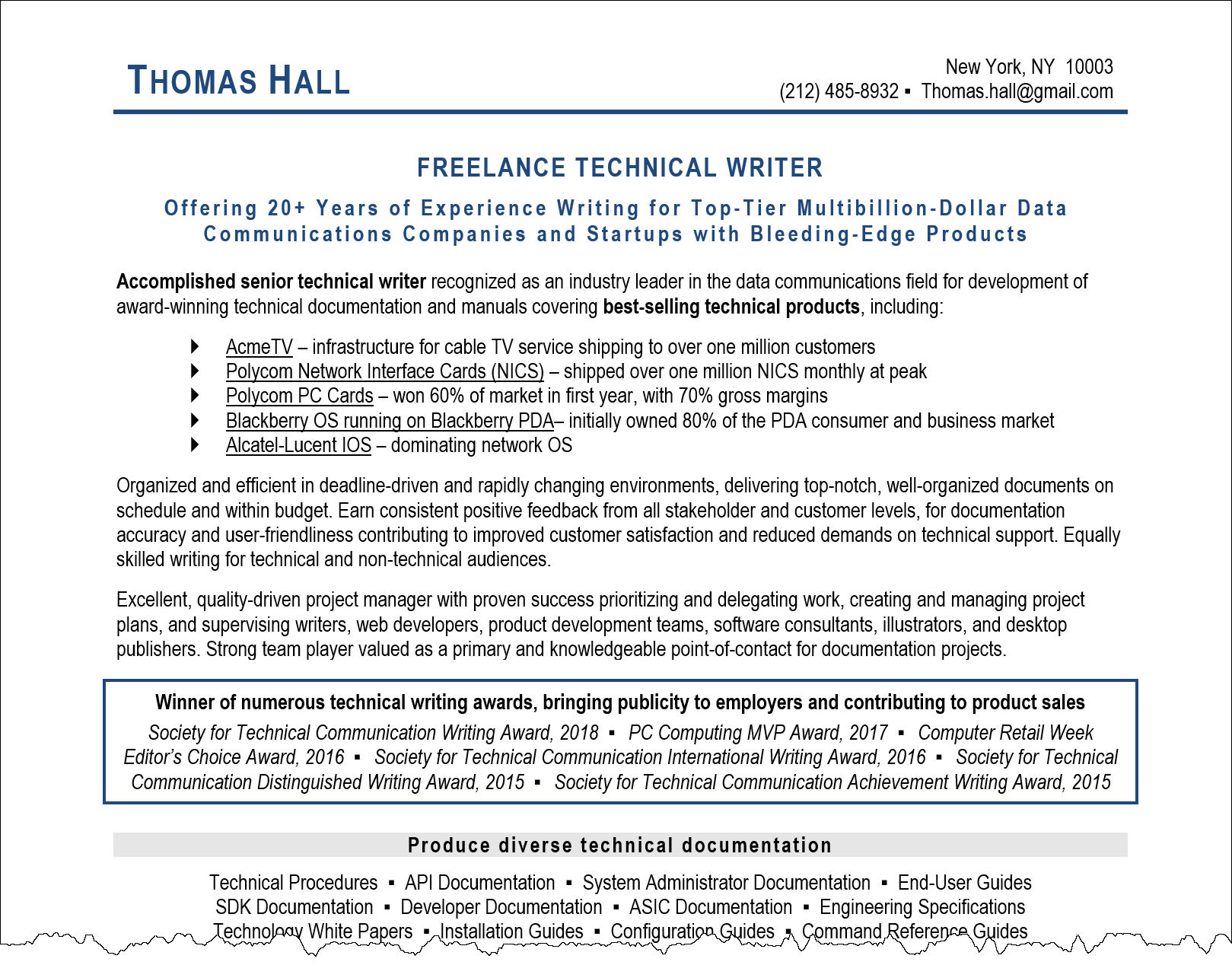
Know who will be reading your resume and making the hiring decision
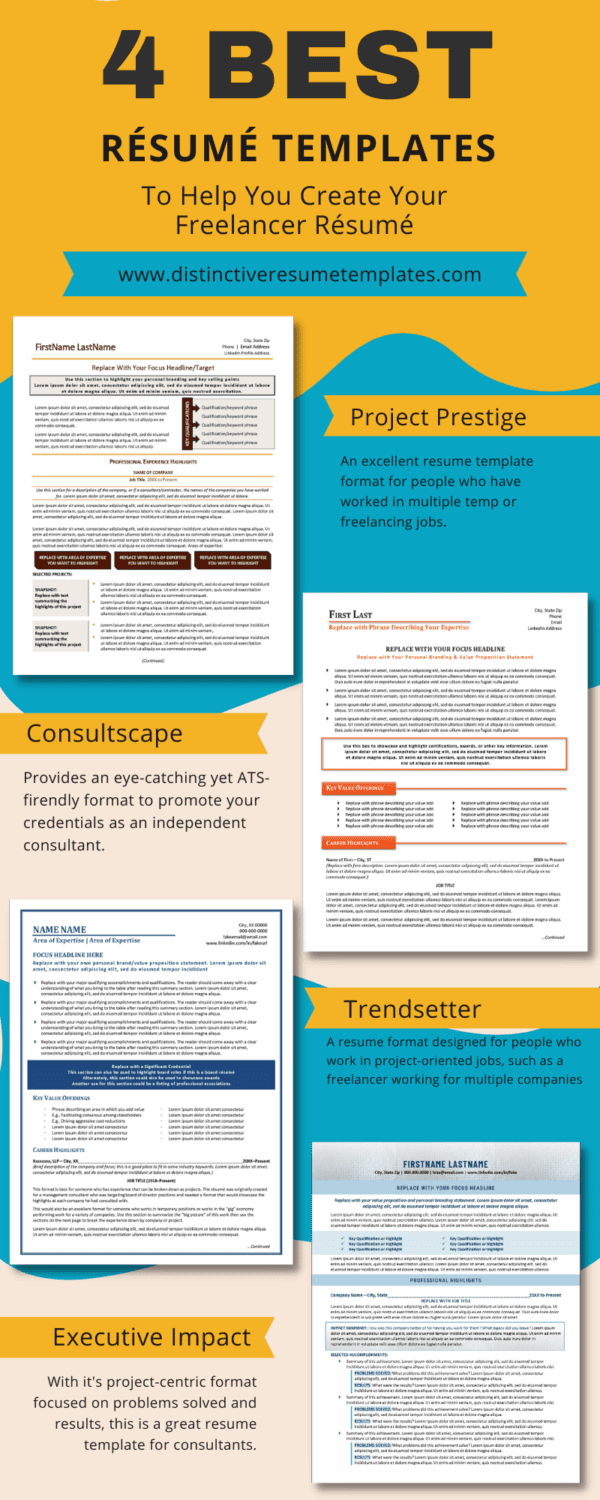 Once you are clear on your focus for your freelancer resume, it is important to consider who will be reading your resume and who will be deciding whether to hire you for your freelance service.
Once you are clear on your focus for your freelancer resume, it is important to consider who will be reading your resume and who will be deciding whether to hire you for your freelance service.
In other words, in what type of company or organization will your services be of value? Try to answer as many of the following questions as possible, in as much detail as possible:
- What industry or industries will you be targeting?
- What type of organization are you targeting (e.g., bricks and mortar, online, small local, large corporate, etc.)?
- Is your target freelance employer in a certain lifecycle as a company (e.g., start-up, growing and expanding, turnaround, reorganization, etc.)?
- If it is a larger organization, are you targeting a particular department?
- Who are you trying to reach with your freelancer resume? What position does that person hold with the organization? Is this the same person who will e making the hiring decision? If not, who is the decision-maker?
In some cases, if you are pursuing a large contract, you might want to tailor your resume to a specific company. Or your answers might be a bit broader. But in either case, you should try to answer these questions in as much detail as possible. Why? Simple. This will help you focus your freelancer resume more, but it will also help you put yourself into the “shoes” of your target decision-maker.
With your answers to the above, give some deep thought to the key factors that will appeal to your target. When they hire you as a freelancer, they will be investing. Nobody makes an investment without wanting a return on that investment. Your goal in this step is to understand what those desired investment returns are to write your resume to show how you can deliver those returns.
Think in terms of the following. Will hiring you as a freelancer help the company…
- Make money?
- Save money?
- Improve efficiency?
- Increase productivity?
- Strengthen relationships?
- Bring in new customers?
- Solve a problem?
Understanding the decision maker’s motivation for hiring a freelancer for the area of expertise you offer will guide you in deciding what to include in your freelancer resume.
Write your freelancer resume to focus on the needs of the decision-maker
You will be ready to begin writing your freelancer resume content with your answers to all the questions in the first two steps. As you write your resume, focus on your accomplishments and value-add for the past companies that have hired you.
Always remember that stating on your resume that you have a qualification is simply a statement that you have the potential ability to do something. It doesn’t prove that you can put that qualification into practice to deliver results.
An accomplishment that proves you’ve delivered a result in the past is what will convince the freelance employer you can deliver a return on their investment in hiring you. This is why it is so important to include accomplishments and concrete results in your resume.
Here is another excerpt example from the same freelance technical writer’s resume. The sections highlighted in yellow speak to the accomplishments and return on investment this freelancer delivered. This will be quite persuasive if the target employer is in a similar position and needs help with a growing startup.

Choose the best format for your resume
Traditionally, most professionals use what is called a chronological resume format. A chronological format might work well for a freelancer who takes on long-term contract projects. But, if you are in the more common situation of working for multiple companies, and sometimes simultaneously, a chronological format will make you look like a job hopper. This may also make reading the resume overwhelming.
In this case, you will want to consider using a more modern combination format resume to present your contracts.
You have great creative leeway when you use a combination resume format. Generally, this will include a focus and summary section similar to this post’s first example freelancer resume excerpt. Follow this with the highlights of your relevant past employment and freelance contracts that may or may not be presented chronologically. Finally, list your education, training, and other relevant credentials for your target freelance position.
While the exact structure of how this will look in your resume will necessarily be as unique as you are, here are some examples.
As shown in this next example, one option is to list your entire time as a freelancer or consultant under one listing, as we did in the resume of this freelance consultant. You can then use the accomplishment bullets to call attention to “typical projects.”
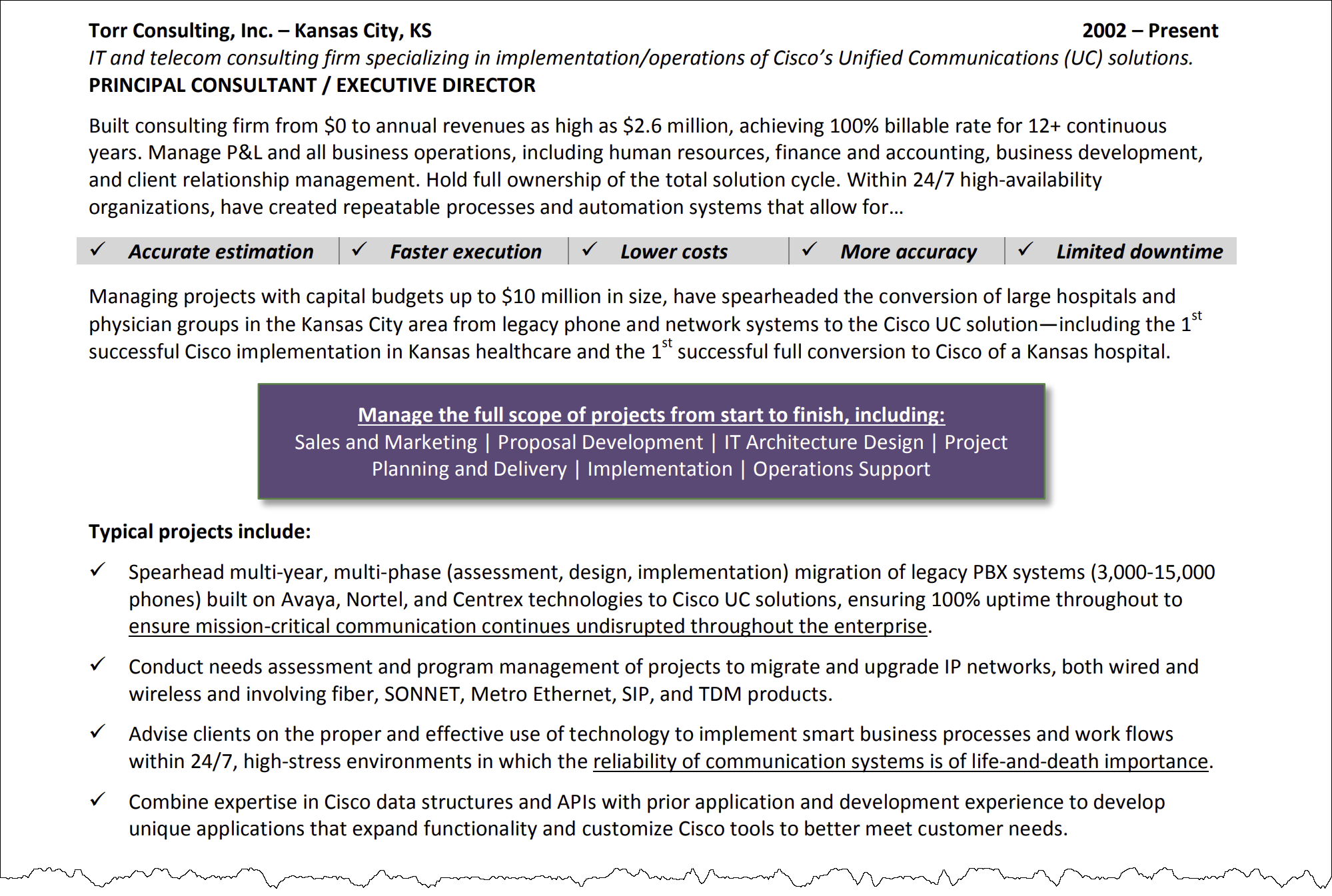
If each of the projects you have worked on is substantial, another possibility, as shown in this excerpt from the same resume above, is to break out each freelance project as a “story” telling about the challenges, actions, and results of the project.
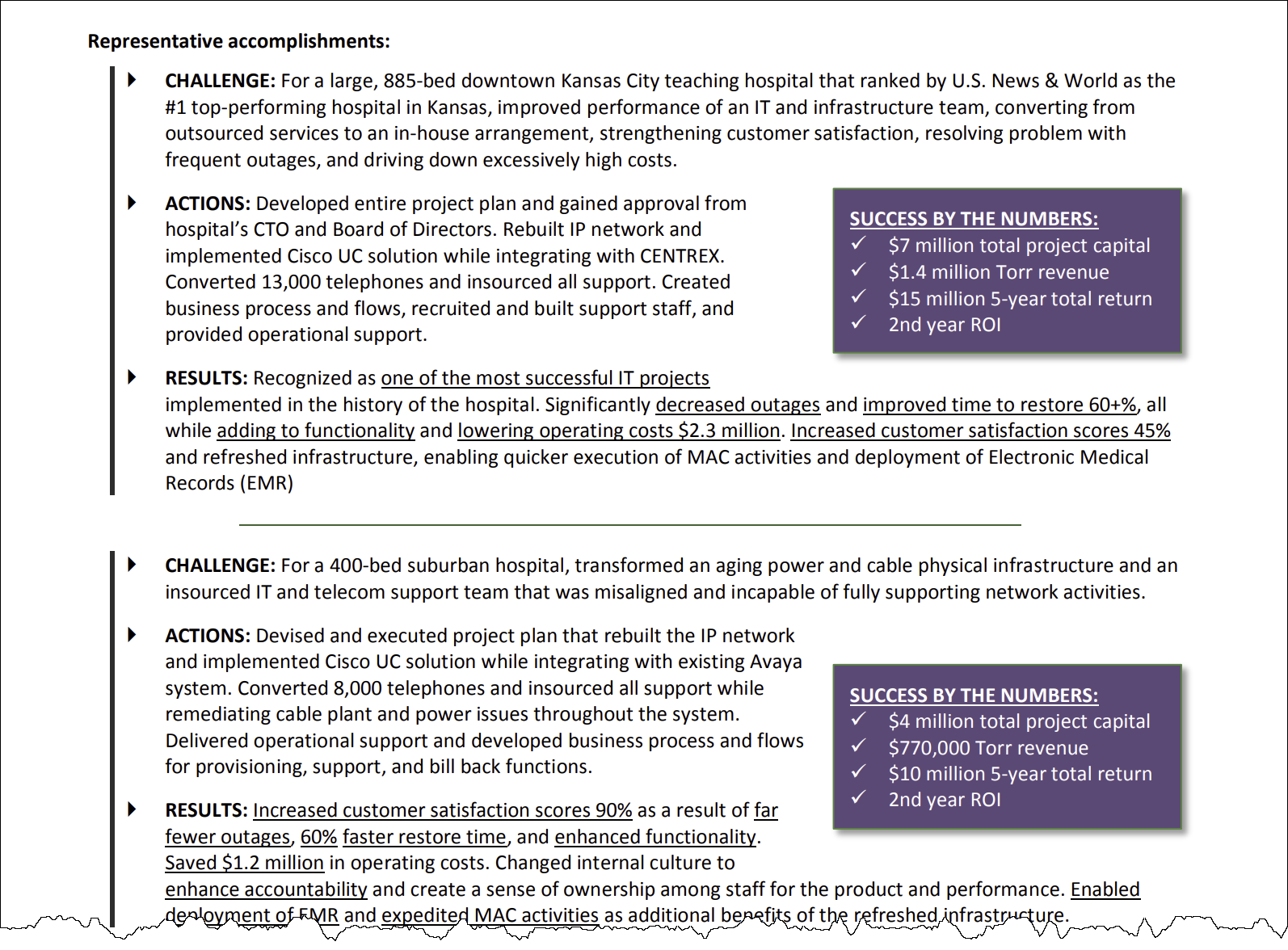
This example shows another possibility. This freelancer had experience working with 11 different companies. Detailing each out would have made him look like a job hopper. The truth was that he completed these individual freelance projects under the umbrella of his independent consulting firm. Grouping them all in this way was an effective way of detailing the company names (redacted in this example), some of which were large and impressive, while showing just the highlights of the projects he worked on.

Final Thoughts
If you are overwhelmed thinking about how to write your freelancer resume, help is available. Hiring a professional resume writer is an investment that will produce great returns.
As a freelancer, you must present yourself in the best possible light, marketing yourself as the solution to the needs and problems of the hiring decision-makers for freelance jobs. While there are many benefits to working in the gig economy, a con is that you have no employment security. Therefore, you must continually sell yourself and your services.
Working with a professional resume writer to create a standout resume like the example freelancer resumes in this article will give you a definite competitive edge and help you win jobs faster and more continuously. For help with your freelancer resume, schedule a free consultation with us. We’ll discuss your situation and help you decide if the professional help of a resume writer will be of value to you.
Frequently Asked Questions
What is a freelancer resume?
A freelancer resume is a document that showcases your skills, experience, and accomplishments as a self-employed individual. It’s used to apply for freelance jobs or consulting gigs, and it plays a crucial role in selling your abilities to potential clients.
How do I write a freelancer resume?
To write a freelancer resume, first identify the freelance service you’re offering and what qualifies you to provide it. Then, consider who will be reading your resume and what they’re looking for. Write your resume to focus on these needs, highlighting your accomplishments and the value you’ve added in past roles.
What should I include in my freelancer resume?
Your freelancer resume should include a clear focus headline and professional summary, details of your relevant past employment and freelance contracts, and a list of your education, training, and other relevant credentials. It’s important to focus on accomplishments and concrete results that demonstrate your ability to deliver a return on investment.
What format should I use for my freelancer resume?
If you’ve worked on long-term contract projects, a chronological resume format might work well. However, if you’ve worked for multiple companies, sometimes simultaneously, a combination resume format could be more effective. This format allows you to present your contracts in a way that doesn’t make you look like a job hopper.
How can a professional resume writer help with my freelancer resume?
A professional resume writer can help you present yourself in the best possible light, marketing you as the solution to the needs and problems of potential clients. They can help you focus your resume on the key factors that will appeal to your target audience, ensuring that your resume effectively showcases your ability to deliver a return on investment.
Why is a freelancer resume important?
A freelancer resume is important because it helps you sell your skills and services to potential clients. As a freelancer, you must continually market yourself and your services, and a well-crafted resume is a key tool in this process.
How can a freelancer resume help me get more gigs?
A well-written freelancer resume can help you get more gigs by showcasing your skills, experience, and past accomplishments. It can demonstrate to potential clients that you have the qualifications and proven ability to deliver results, making them more likely to hire you for their projects.





